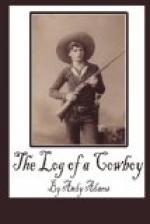Quince Forrest was spending his winnings as well as drinking freely, and at the end of a quadrille gave vent to his hilarity in an old-fashioned Comanche yell. The bouncer of the dance hall of course had his eye on our crowd, and at the end of a change, took Quince to task. He was a surly brute, and instead of couching his request in appropriate language, threatened to throw him out of the house. Forrest stood like one absent-minded and took the abuse, for physically he was no match for the bouncer, who was armed, moreover, and wore an officer’s star. I was dancing in the same set with a red-headed, freckled-faced girl, who clutched my arm and wished to know if my friend was armed. I assured her that he was not, or we would have had notice of it before the bouncer’s invective was ended. At the conclusion of the dance, Quince and The Rebel passed out, giving the rest of us the word to remain as though nothing was wrong. In the course of half an hour, Priest returned and asked us to take our leave one at a time without attracting any attention, and meet at the stable. I remained until the last, and noticed The Rebel and the bouncer taking a drink together at the bar,—the former apparently in a most amiable mood. We passed out together shortly afterward, and found the other boys mounted and awaiting our return, it being now about midnight. It took but a moment to secure our guns, and once in the saddle, we rode through the town in the direction of the herd. On the outskirts of the town, we halted. “I’m going back to that dance hall,” said Forrest, “and have one round at least with that whore-herder. No man who walks this old earth can insult me, as he did, not if he has a hundred stars on him. If any of you don’t want to go along, ride right on to camp, but I’d like to have you all go. And when I take his measure, it will be the signal to the rest of you to put out the lights. All that’s going, come on.” There were




